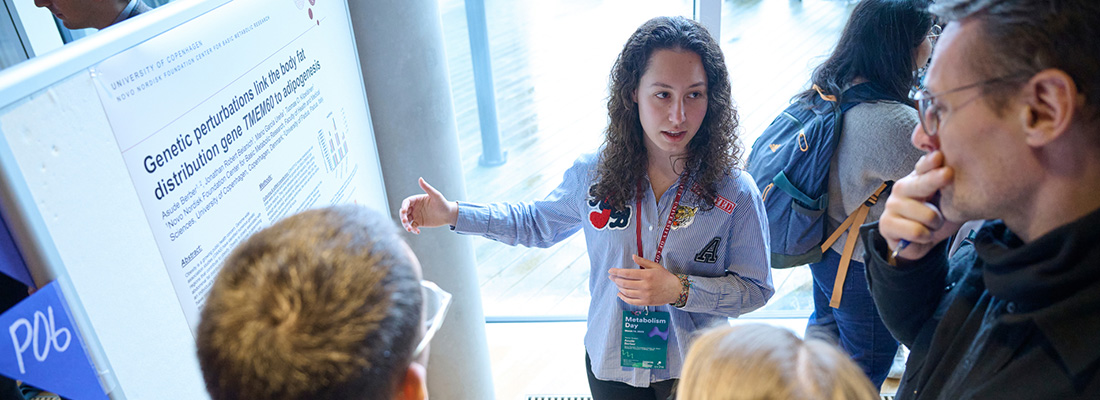Education and educational activities

The Center’s mission is to provide the highest standards in the training of future scientists by developing transferable skills and career opportunities for Center researchers. The Center’s educational activities comprise undergraduate and postgraduate teaching and public outreach that wherever appropriate draw on Center research and the unique opportunities of being a University-based research center.
The Center's strategy is integrated with the overall strategy of the Faculty of Health and Medical Sciences. The Center collaborates closely with the Department of Biomedical Sciences (BMI) and the Department of Cellular and Molecular Medicine (ICMM) on educational activities.
The Center’s mission is to provide the highest standards in the training of future scientists by developing transferable skills and career opportunities for Center researchers. The Center’s educational activities comprise undergraduate and postgraduate teaching and public outreach that wherever appropriate draw on Center research and the unique opportunities of being a University-based research center.
The Center’s strategy is integrated with the overall strategy for the Faculty of Health and Medical Sciences "Goals and Action Plan 2018/2019 and four years ahead". The Center collaborates closely with the Department of Cellular and Molecular Medicine (ICMM) and Department of Biomedical Sciences (BMI) on educational activities, and participates in teaching and other educational activities as described in the BMI strategy.
Specific strategy for educational activities
The role of Center scientists is to perform cutting-edge research and contribute to educational activities such as undergraduate teaching, extracurricular undergraduate educational activities, postgraduate education and supervision, and public education and engagement. The scientists at the Center are expected to contribute to the educational effort of the University. As academic research positions may differ with respect to the amount and type of expected teaching as well as the amount of time allocated for research, the amount and nature of educational activities is to be negotiated at the annual performance and development reviews (PDRs). Center scientists’ teaching activities may comprise e.g. classroom teaching at undergraduate courses, supervision of practical lab activities or undergraduate theses, development of massive open online courses (MOOCs) or participation in school visits to the Faculty.
Outreach activity
The program on Metabolic Science in Culture is unique in that it integrates the common themes across the Center’s research programs and translates them into research-based public engagement activities. The Center aims to develop communication activities that situate metabolic science in a public cultural context, primarily through a focus on the materiality of the laboratory, clinic, and everyday life, and how objects from these different domains can be used in museum, event, and online communication. The museum is situated in short distance to the Maersk Tower, where the program also produces exhibits and events. See more here:
museion.ku.dk/balance-og-stofskifte/
museion.ku.dk/mind-the-gut/
museion.ku.dk/verden-er-i-dig/
Center researchers contribute to delivering the highest standards in the training of future scientists. Many younger researchers express interest in undergraduate teaching, recognizing the central importance of teaching for their academic careers. Center scientists are strongly encouraged to interact with the Department of Biomedical Sciences and the Department of Cellular and Molecular Medicine for teaching opportunities.
CBMR employees can read more here.
At the Center you will find:
- International research and study environment
- Supervision and mentoring
- State-of-the-art biomedical laboratory facilities
The Center is always seeking highly motivated and engaged students – both on bachelor and master level. You will be part of one of our research groups that works within your area of interest. Both Danish and international students are accepted.
Organizational implementation
The Center uses the University-wide procedures outlined below for engagement in teaching activities, developing teaching competences, and encouraging reflective development of the teaching portfolio.
Discussion of teaching portfolios in the annual performance and development reviews (PDR) (KU intranet - login needed) will be a key tool to encourage more Center scientists to participate in undergraduate education (see below).
From 2018, all teachers at UCPH must prepare and maintain a teaching portfolio to strengthen the quality of teaching and to promote an equal balance between teaching and research. At the same time, UCPH also introduces a pedagogical competence profile, which will be used in conjunction with the teaching portfolio to ensure a common language and criteria for good teaching.
For detailed information, follow these links:
- University guidelines for teaching portfolios when appointing academic staff at the University of Copenhagen
- Teaching portfolio (KU intranet - login needed)
- Tips for teaching portfolio in job applications (KU intranet - login needed)
The University requires that assistant professors who contribute to teaching must take the teaching and learning in higher education programme or corresponding training.
Postdocs who contribute to teaching must take the Introduction to University Pedagogy (IUP) course or corresponding training.
For detailed information, follow these links:
Contact
Senior Consultant
Sarah Vigh Christoffersen
+45 35 32 62 82
sarah.christoffersen@sund.ku.dk
